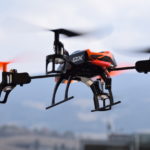 Trust in technology is a topic I’ve touched upon numerous times recently, with a series of studies highlighting how important it is for our willingness to adopt everything from autonomous vehicles to AI doctors.
Trust in technology is a topic I’ve touched upon numerous times recently, with a series of studies highlighting how important it is for our willingness to adopt everything from autonomous vehicles to AI doctors.
A recent study from PwC explores whether public perceptions of drone technologies are holding back adoption in the UK. The research saw both the general public and business leaders quizzed on their attitudes both towards drones themselves, and regulation of them.
The results suggest that the general public are generally negative towards the technology, with business leaders believing this is significantly holding back wider adoption. Indeed, fewer than 1 in 3 people thought positively about drones, with many believing they are used for criminal activity.
Lack of familiarity
This is perhaps due in part to a lack of familiarity with the technology, as when business leaders whose organizations were using drones were asked, 83% thought positively about the technology.
“There are clear disparities in attitudes towards drones between business and the wider public. It is also strikingly clear that the potential of drone technologies is not fully understood. The drone community across industry, government and civil society needs to change the public discourse from one of uncertainties and toys, to one of opportunity and accountability,” PwC say.
They believe that education is vital if trust in drone technology is to be established. Over half of business leaders reported that a lack of understanding existed about drone technology in general, and few people thought that they would even know if a drone was being misused or not.
This feeds into general ambiguity around regulation, which helps to underpin general uncertainty and the negative perceptions around the technology.
“Drones could transform how we move people and goods around, boosting our economy and even saving lives,” UK Aviation Minister Baroness Vere says. “A drone used safely and responsibly is a great asset, which is why the Government is encouraging innovation and the development of technology in its forthcoming Aviation Strategy and Future Flight Challenge.”
I suspect this is simply a matter of familiarity, and as drones become a more common presence in the skies, perceptions will rapidly shift. Until that point however, more work needs to be done on public education.